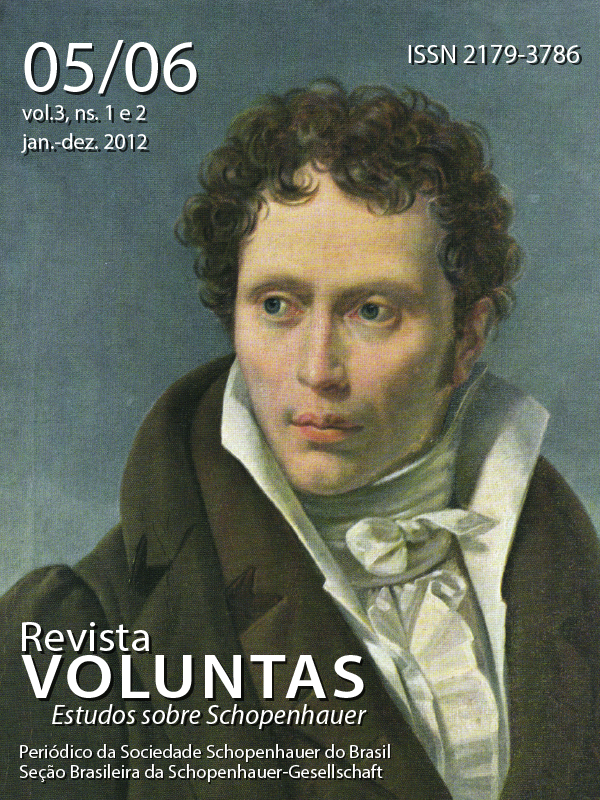The society as will and representation: The theory of society in schopenhauerian eudemonology
DOI:
https://doi.org/10.5902/2179378633990Keywords:
Eudemonology, Social philosophy, Political philosophyAbstract
In this paper I am concerned with the theory of society that Schopenhauer presents in his Aphorismen zur Lebensweisheit. First, I try to develop the link of these aphorisms with the rest of his philosophy, so I analyze the genesis of eudemonology especially in the posthumous manuscripts of 1826-1830. My next step consists in using the distinction between will and representation as a hermeneutical tool for the interpretation of Schopenhauer’s social theory: in the paragraph about society as representation, I focus on his criticism of honor and its implications for the theory of society and in the paragraph about society as will, I analyse the factors of social coercion and cohesion considered by Schopenhauer. In the conclusion, I highlight the importance of this social theory embedded in Schopenhauer’s eudemonology for his political philosophy.Downloads
References
SCHOPENHAUER, Arthur. Werke in fünf Bänden. Nach den Ausgaben letzter Hand. Hrsg. von L. Lütkehaus. Zürich: Haffmans Verlag, 1988 (1988-1989).
ATWELL, John. Schopenhauer on the Character of the World. The Metaphysics of Will. Berkeley: University of California Press, 1995.
DOS SANTOS DURANTE, Felipe. «Arthur Schopenhauer e a Tradição Jusnaturalista Moderna». In: Revista Voluntas: estudos sobre Schopenhauer. Nº 1, Vol. 2 (2011): 108-118.
GODART-VAN DER KROON, Annette. «Schopenhauer’s Theory of Justice and its Implication to Natural Law». Schopenhauer-Jahrbuch, 84 (2003): 121-146.
GRACIÁN, Baltasar. Oráculo manual y arte de prudencia. Ed. de Emilio Blanco. Madrid: Cátedra, 2007.
HANNAN, Barbara. The Riddle of the World. A Reconsideration of Schopenhauer’s Philosophy. Oxford: Oxford University Press, 2009.
HOPF, Michael. «Ansätze zu einer Theorie des ‘Minimalstaates’ auf der Basis der Rechts- und Staatsvorstellungen Schopenhauers». En SCHIRMACHER, Wolfgang (Hrsg.): Zeit der Ernte. Stuttgart:
Frommann-Holzboog, 1982.
HÜBSCHER, Arthur. Denker gegen den Strom. Schopenhauer: Gestern–Heute–Morgen. Bonn: Bouvier, 1982.
INGENKAMP, Heinz-Gerd. «Schopenhauer als Eudaimonologe». IN: Schopenhauer-Jahrbuch, 87 (2006): 77-90.
LÜTKEHAUS, Ludger. Schopenhauer. Metaphysischer Pessimismus und ,,soziale Frage”. Bonn: Bouvier, 1980.
LÜTKEHAUS, Ludger. «,,Ehrensachen meiden”. Schopenhauers Auseinandersetzung mit dem ,,Princip der Ehre”». In: Schopenhauer-Jahrbuch, 87 (2006): 91-100.
NEYMEYR, Barbara. «Pessimistische Eudemonologie? Zu Schopenhaues Konzeption des Glücks». Schopenhauer-Jahrbuch, 77 (1996): 133-166.
NIETZSCHE, Friedrich. Kritische Studienausgabe. 15 vol. Hrsg. von G. Colli und M. Montinari. Berlin: DTV – Walter de Gruyter, 1999.
ONFRAY, Michel. «Schopenhauer et “la vie heureuse”». Les Radicalités existentielles. Contre-histoire de la philosophie, 6. Paris: Grasset, 2009.
SAFRANSKI, Rüdiger. Schopenhauer und die wilden Jahre der Philosophie. Frankfurt a.M.: Fischer, 2001.
SIMMEL, Georg. Schopenhauer y Nietzsche. Trad. de Fco. Ayala. Sevilla: Espuela de Plata, 2004.
SPIERLING, Volker. «Erkenntnis und Ethik», introducción a su edición de A. Schopenhauer, Metaphysik der Sitten. München: Piper, 1985.
SPIERLING, Volker. Arthur Schopenhauer. Philosophie als Kunst und Erkenntnis. Zürich: Haffmans,
WOLF, Jean-Claude. «Schopenhauers Liberalismus». Schopenhauer-Jahrbuch, 78 (1997): 63-86.
WÜRKNER, Joachim. «Staatsidee und Schopenhauer-Welt». Archiv für Rechts- und Sozialphilosophie, 75 (1989): 82-103.
ZIMMER, Robert. «Philosophie der Lebenskunst aus dem Geist der Moralistik. Zu Schopenhauers Aphorismen zur Lebensweisheit». Schopenhauer-Jahrbuch, 90 (2009): 45-64.
ZIMMER, Robert. Arthur Schopenhauer. Ein philosophischer Weltbürger. München: DTV, 2010
Downloads
Published
How to Cite
Issue
Section
License
The submission of original manuscripts to this journal implies the transference, by the authors, of the copyrights for printed and digital publication. The copyrights of a published manuscript belong ultimately to the author, and only the copyright for its first publication is reserved to the journal. Authors may only use the same results in other publications explicitly indicating this journal as the medium of the original publication.
Licence
Attribution-NonCommercial-ShareAlike 4.0 International (CC BY-NC-SA 4.0) - This license lets others remix, tweak, and build upon your work non-commercially, as long as they credit you and license their new creations under the identical terms.






